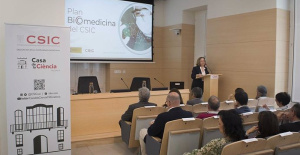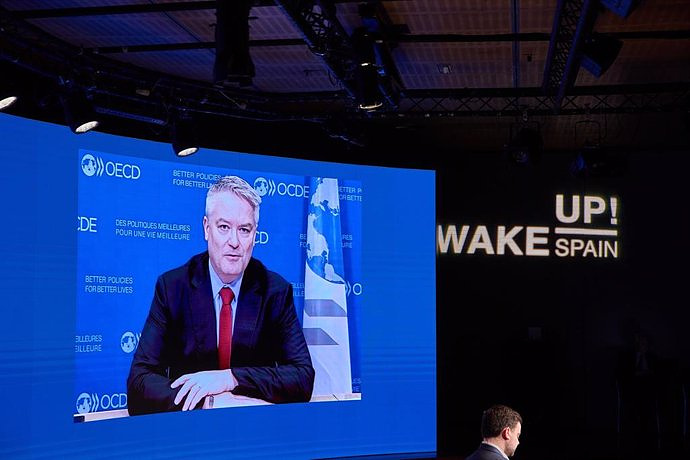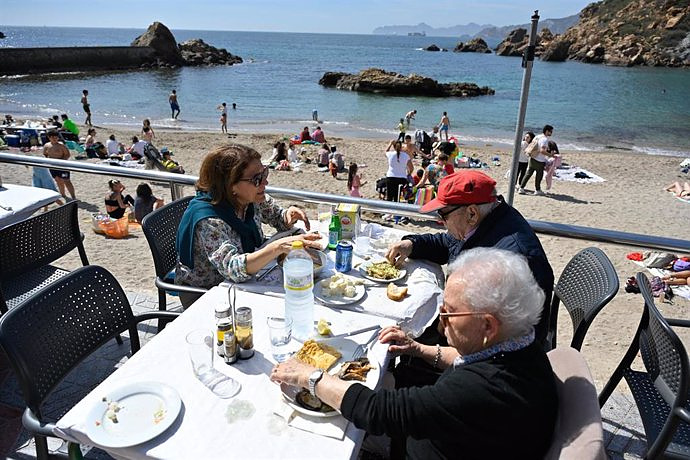A McKinsey report calculates that investment in the ecological transition could sustain 1,100,000 jobs on average
MADRID, 28 Sep. (EUROPA PRESS) -
Spain could reach the milestone of zero net emissions in 2045 and reach negative emissions -- absorbing more greenhouse gases than it emits -- in 2050 if it invests an average of 85,000 million euros a year in green technologies or close 6.2% of GDP, according to a report by the consulting firm McKinsey
The accumulated investment would be around 2.5 trillion euros until 2050 and would be one percentage point above the estimated investment for a more conservative scenario based on current policies.
The report 'Net zero Spain: Europe's decarbonisation pole' highlights the wealth of natural and technological resources that Spain has and that give it the opportunity to become "the European leader in sustainability and clean energy".
Specifically, it mentions solar resources and the penetration of wind energy, which present "an immense potential for the development of green hydrogen", as well as the "robust natural gas transportation infrastructure" that could be used to transport hydrogen, and the possibility of increasing the absorption of carbon dioxide through techniques such as reforestation.
The report specifies that transport and industry represent more than 65% of net emissions in Spain, so these sectors are key to achieving climate neutrality in 2045. Thus, electrification, green hydrogen and biofuels would be the three main areas on which the energy transition would depend in this horizon.
On the other hand, McKinsey celebrates the "clear commitment" of the public sector and adds that Spain is the second country with the largest allocations of aid funds from the European Union (more than 70,000 million euros).
The report proposes an alternative scenario to the current ecological transition policies and plans, urges to accelerate the response to climate change and suggests that the reduction of emissions at the national level by 2030 could be up to 46% compared to 2019 if they are increased the efforts.
In the case of transport, which generates almost a third of the emissions in Spain, McKinsey says that it could reach a reduction of 50% by 2030 and 100% by 2050 thanks to electric vehicles and biofuels, for which this sector should receive almost two thirds of the total investment proposed in this horizon.
As for industry, which accounts for another third of emissions and could achieve a reduction of 85% in 2050, it indicates that competitiveness and sustainability can be improved in segments such as steel, cement, chemicals or petrochemicals, in which that hydrogen, biofuels and carbon capture could play an essential role in the transformation and reindustrialization of the country.
On the other hand, the McKinsey scenario for 2050 estimates a doubling of electrical energy, since the electrification of the economy is one of the key levers for the transition, and the sector should receive between 15% and 20% of the investment to reduce 100% of greenhouse gases for that year. Finally, another 15% of the investment should go to the residential and commercial buildings sector to also achieve that 100% reduction in their emissions.
McKinsey advocates trying to "avoid the significant physical, social and economic risks that Spain could face." The study says, for example, that if temperatures rise more than two degrees Celsius compared to pre-industrial levels, some areas of southern Spain could experience 45 days a year with maximums above 37 degrees, with the consequent impact on health. of the population and on certain economic activities.
The general increase in temperature due to the climate impact could reduce the production of four of the most relevant crops, such as grapes, olives, tomatoes and wheat, while tourism could find it difficult to maintain its current attractiveness, especially in the highest season.
The scenario imagined by the consultant would also have a direct and substantial impact on the economy, supporting more than 1,100,000 jobs on average until 2050, which is 200,000 more jobs than in the scenario based on current decarbonization policies .
Joseba Eceiza, leader of the Sustainability Practice in Spain and Portugal at McKinsey, has highlighted that "the global economy is facing the greatest reallocation of capital in history" and Spain is facing "a unique opportunity to lead this ecological and economic transition" .
Between 2007 and 2019, Spain managed to reduce its emissions by 32%, compared to 20% in the rest of Europe, mainly thanks to investment in renewable electricity generation capacity.
In order to continue making progress in the ecological transition, it will require, according to McKinsey, the joint action of all sectors of the economy in Spain, ensuring "that resources, technologies and supply chains are available at scale, that adjustments in economic variables are carried out in a sustainable and inclusive manner and that both the public and private sectors sustain their commitments and move towards their objectives in a constant manner".
The report concludes that Spain already has the key conditions to be a green pole in Europe: it has the second highest level of wind power capacity penetration after Germany, highly competitive photovoltaic solar energy and a highly developed gas transportation infrastructure. that could be used to transport hydrogen.
David González, senior partner at McKinsey and leader of the Energy and Materials practice in Spain and Portugal, stated that "Spain could go from being one of the global leaders in the new decarbonized economy, establishing a sustainable hub with a global reach and facilitating the ecological transition of other countries in the region".
González pointed out that "the strategic position and excellent infrastructure for natural gas could be leveraged towards the transport of hydrogen to supply the rest of Europe", whether it is produced locally or imported from North Africa, and that Spain has "great potential of carbon absorption" as it is the eighth country in the EU with the highest forest cover, 37% of its total area, compared to 34% of the European average.
McKinsey
In fact, the banking supervisor is already redoubling efforts to ensure that the climate factor is considered in credit risk management, and many entities reward their clients for decisions that promote sustainability through loans for electric vehicles or improvement of conditions in mortgages with efficient energy consumption.
Individual transition plans for companies, the development of new technologies such as green hydrogen or home improvements in relation to energy consumption are also financed. McKinsey anticipates that in the coming years the financing of projects that favor the transition and of green activities will be the main focus of banking efforts, encouraged by the advancement of European legislation to complement the capital ratio with the green asset ratio.

 Exploring Cardano: Inner Workings and Advantages of this Cryptocurrency
Exploring Cardano: Inner Workings and Advantages of this Cryptocurrency Seville.- Economy.- Innova.- STSA inaugurates its new painting and sealing hangar in San Pablo, for 18 million
Seville.- Economy.- Innova.- STSA inaugurates its new painting and sealing hangar in San Pablo, for 18 million Innova.- More than 300 volunteers join the Andalucía Compromiso Digital network in one month to facilitate access to ICT
Innova.- More than 300 volunteers join the Andalucía Compromiso Digital network in one month to facilitate access to ICT Innova.-AMP.- Ayesa acquires 51% of Sadiel, which will create new technological engineering products and expand markets
Innova.-AMP.- Ayesa acquires 51% of Sadiel, which will create new technological engineering products and expand markets The Prosecutor's Office requests that the AN investigate the detainee for terrorism for damaging an ax in a McDonalds in Badalona
The Prosecutor's Office requests that the AN investigate the detainee for terrorism for damaging an ax in a McDonalds in Badalona Balearic PSOE denounces the director of IbSalut for prevarication for renouncing the mask claim file
Balearic PSOE denounces the director of IbSalut for prevarication for renouncing the mask claim file Otxandiano reproaches that PSOE "has lent itself" to taking out ETA in the campaign, like the extreme right against Sánchez
Otxandiano reproaches that PSOE "has lent itself" to taking out ETA in the campaign, like the extreme right against Sánchez Puigdemont claims to have a "well grasp" of the State and asks to "be respected" to obtain more transfers
Puigdemont claims to have a "well grasp" of the State and asks to "be respected" to obtain more transfers How Blockchain in being used to shape the future
How Blockchain in being used to shape the future Not just BTC and ETH: Here Are Some More Interesting Coins Worth Focusing on
Not just BTC and ETH: Here Are Some More Interesting Coins Worth Focusing on Valencia displays its "innovative and technological potential" at the Emerge Americas event in Miami
Valencia displays its "innovative and technological potential" at the Emerge Americas event in Miami The CSIC incorporates the challenges of robotics, nanotechnology and AI in the new strategic plan for biomedicine
The CSIC incorporates the challenges of robotics, nanotechnology and AI in the new strategic plan for biomedicine Innovation allocates 9.1 million to train 74,000 people and guarantee digital inclusion
Innovation allocates 9.1 million to train 74,000 people and guarantee digital inclusion LIFE SPOT manages to develop new green treatments that eliminate groundwater contamination
LIFE SPOT manages to develop new green treatments that eliminate groundwater contamination A million people demonstrate in France against Macron's pension reform
A million people demonstrate in France against Macron's pension reform Russia launches several missiles against "critical infrastructure" in the city of Zaporizhia
Russia launches several missiles against "critical infrastructure" in the city of Zaporizhia A "procession" remembers the dead of the Calabria shipwreck as bodies continue to wash up on the shore
A "procession" remembers the dead of the Calabria shipwreck as bodies continue to wash up on the shore Prison sentences handed down for three prominent Hong Kong pro-democracy activists
Prison sentences handed down for three prominent Hong Kong pro-democracy activists ETH continues to leave trading platforms, Ethereum balance on exchanges lowest in 3 years
ETH continues to leave trading platforms, Ethereum balance on exchanges lowest in 3 years Investors invest $450 million in Consensys, Ethereum incubator now valued at $7 billion
Investors invest $450 million in Consensys, Ethereum incubator now valued at $7 billion Alchemy Integrates Ethereum L2 Product Starknet to Enhance Web3 Scalability at a Price 100x Lower Than L1 Fees
Alchemy Integrates Ethereum L2 Product Starknet to Enhance Web3 Scalability at a Price 100x Lower Than L1 Fees Mining Report: Bitcoin's Electricity Consumption Declines by 25% in Q1 2022
Mining Report: Bitcoin's Electricity Consumption Declines by 25% in Q1 2022 Oil-to-Bitcoin Mining Firm Crusoe Energy Systems Raised $505 Million
Oil-to-Bitcoin Mining Firm Crusoe Energy Systems Raised $505 Million Microbt reveals the latest Bitcoin mining rigs -- Machines produce up to 126 TH/s with custom 5nm chip design
Microbt reveals the latest Bitcoin mining rigs -- Machines produce up to 126 TH/s with custom 5nm chip design Bitcoin's Mining Difficulty Hits a Lifetime High, With More Than 90% of BTC Supply Issued
Bitcoin's Mining Difficulty Hits a Lifetime High, With More Than 90% of BTC Supply Issued The Biggest Movers are Near, EOS, and RUNE during Friday's Selloff
The Biggest Movers are Near, EOS, and RUNE during Friday's Selloff Global Markets Spooked by a Hawkish Fed and Covid, Stocks and Crypto Gain After Musk Buys Twitter
Global Markets Spooked by a Hawkish Fed and Covid, Stocks and Crypto Gain After Musk Buys Twitter Bitso to offset carbon emissions from the Trading Platform's ERC20, ETH, and BTC Transactions
Bitso to offset carbon emissions from the Trading Platform's ERC20, ETH, and BTC Transactions Draftkings Announces 2022 College Hoops NFT Selection for March Madness
Draftkings Announces 2022 College Hoops NFT Selection for March Madness


























